
Bay Area Institute
My Teacher Institute Summer Institute lessons are posted on line.
www.exo.net/~pauld, it's important to publish workshops.
Web addresses:

Is there time in the school curriculum for students in particular high school students to use inquiry based methods to learn science?
I believe that learning through inquiry is an essential part of doing science.
Here is what I teach in my summer Institute for High School Science Teachers.
Scientists must know their scientific specialty in great depth, they must be able to answer the question of "How do you Know That?", when they make a scientific statement. How they know must be based on experimental observations or upon reasoning based on or confirmed by experiments.
Teachers on the other hand are guides to students through the landscape of science, they need to understand the breadth of the discipline, how work is done in science and how it applies to everyday life. They are allowed to say "I don't know" and answer to a student question. However they should know how to find the answer, showing students how to search for answers is a valuable lesson.
(We provide the Pinhole listserve to help teachers find answers. Example, one student asked "what is a vector?" the teacher put the question to pinhole and received pages of discussion including the difference between a vector and a dyadic, then the teacher showed the discussion to the student who was amazed by the complex discussion resulting from what he thought was a simple question.)
Factual Content
There is no doubt that knowledge of scientific "facts" is important when it comes to figuring out answers to real problems in science. John King at MIT calls the necessary background knowledge the "mulch" of science. The California Science Framework is well stocked with this "shit."
However, while good mulch is necessary for the growth of a garden, it is not enough. The knowledgeable gardener has to weave together the necessary ingredients for each plant to grow, light, water soil, defense against the dark bugs. In science, the equivalent to the gardener's knowledge is the students knowledge of how science is done. The gardener gets the knowledge through books, mentoring, and actual experience growing a garden. In the same way the student learns about science by doing real explorations.
What do you really need?
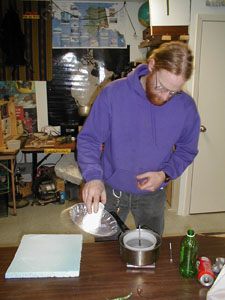
Curt Gabrielson, what do high school students in western China and east Timor really need to know? Curt participated in the reinvention of science education in East Timor. The Indonesians left East Timor with one physicist, a woman with a bachelor's degree to resurrect the science education system. Curt worked with her and the government to base science education on experiencing the phenomena first. Inclined plane experiments using palm leaves with grooves and spherical nuts that roll in these grooves to repeat Galileo's experiment. Students need some factual information, but more than that they need to understand how science works how they can sort out information. (Subversion, what if the state tells you things that you suspect are wrong, that violate the laws of physics, or what we know about infectious diseases?)
The zero'th level
Students need to experience the forgotten fundamentals of science. Before they learn the lens equation they must make images with lenses. It's interesting that students who can solve the equations to calculate where an image is, and even those who can draw ray diagrams when shown a lens and a point of light, have difficulty finding out where the image is.
Science in the News
Case studies: cold fusion, ashfar double slit experiment.
Scientists use the newspaper not peer review.
Social
The teachers who attend our 100 hour workshops experience the joy of learning again. At exhibits we start with perception a subject in which few science teachers have any background, for example we go to the exhibit comparing yellows two people look at the same exhibit and cannot agree about which 2 colors are the same. an important lesson about tolerance for what their students report they see. Perception helps them understand science reports in the newspaper, a person can honestly report what they see and yet you would not see the same thing. Detroit gardeners and me.
The workshops
The workshops run 8:30-10 AM at exhibits.
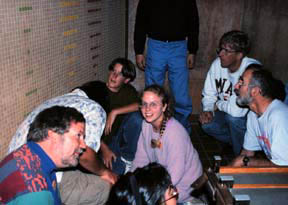
There is a break of 30 minutes or so, Brilliant Linda discovered tthat if we gave the teachers an hour break the Exploratorium would drag us to meetings but that wouldn't happen during a half hour break.
Then in the classroom 10:30 to noon, where we model how to do inquiry in the classroom.
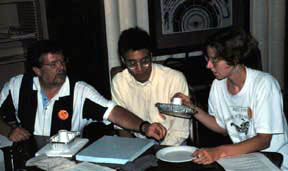
Experiencing the phenomena, feel, hear, see, smell sparks.
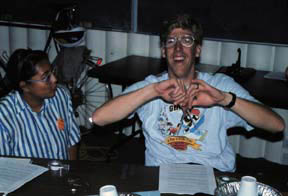
Use simple tools to investigate electric charge, Scotch Magic
Tape.
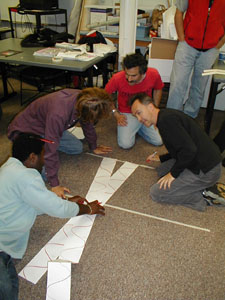
Models of interference lead to important questions which reveal deep
seated misunderstandings held by teachers who have taught
interference using blackboard diagrams for years.
and finally noon to 2 PM where I am available to work individually with teachers to help them with their interests. (my favorite time working with motivated learners.)
Discussions over coffee and donuts or bagels in the morning or after the official end of the workshop are an important part of the workshops.
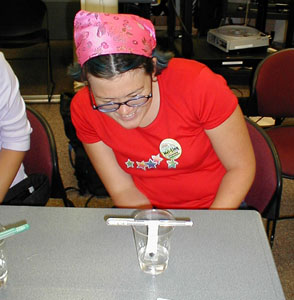
Teachers doing explorations presented by other teachers.
On Friday the entire day is devoted to having the teachers present lessons to each other.(Plus iron science teacher, Paul Trudelle "At first I was petrified of doing a science lesson on Iron Science teacher, now I can't wait.")
Doing Inquiry, generating questions
In workshops where they experience the phenomena. The high school science teachers almost all have a background in the abstraction of science, few have lab experiences those that do, have cookbook lab experiences. We give them a TI lab experience.
Inquiry: start with a guided inquiry, with these materials try this. in 4 groups of 4, what did you see? Report out. sometimes there are disagreements.
Find the image: I set up a minimag light and a large lens and ask them to find the image.
We return to repeat the experiments with variations to resolve differences in observations. Then a third time to let them explore.
Sometimes I encounter observations that I do not understand.
Take a CD on a whiteboard, drop it from the top. What keeps it next to the whiteboard? magnetic forces whiteboards often have steel backs which are magnetic but CD's are not magnets, electrostatic forces whiteboard "ink" sticks by electrostatic forces so perhaps, but rubbing the CD on a whiteboard does not charge the CD, pneumatic forces, which side of the CD is against the wall matters, the flat side or the ribbed side. How about holes drilled in the CD or the center hole covered? The group is more powerful than me alone.
Machine Shop

In the machine shop, "don't cut yourself honey." My husband is getting nervous, I'm looking at the tools in the garage. There is power in creating your own simple science explorations.
Computers
In the learning studio/library, at computers in the classroom where they get to seek out factual information. Which often creates different answers, what is the escape velocity from Phobos? (One result was mine, but there were many different answers.) but computer use is still a minimal part of what we do, under 10%.